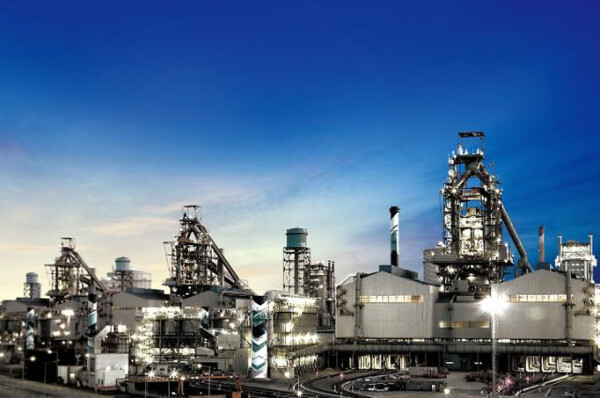
South Korea's leading steelmaker, POSCO, is reportedly considering a significant equity investment in a new electric arc furnace (EAF) steel mill that its domestic rival, Hyundai Steel, plans to build in Louisiana, USA. This potential 'big deal' could see the top two players in the South Korean steel industry joining forces on American soil to navigate the trade barriers imposed by the administration of former (and potentially future) US President Donald Trump.
According to industry sources on April 13th, POSCO is exploring various strategic options, including a stake in Hyundai Steel's upcoming US-based steel plant.
The Hyundai Motor Group has outlined plans to establish an EAF steel mill in Louisiana with a targeted production start date of 2029. The project is estimated to require a total investment of $5.8 billion (approximately ₩8.5 trillion), with Hyundai Steel aiming to attract external investors for roughly half of this amount. POSCO's potential participation in this venture is now under consideration.
POSCO views the United States as a strategically crucial market. In the previous year, the US accounted for approximately 13% of South Korea's total steel exports. POSCO itself exported around 500,000 tons of hot-rolled steel to the US during the same period.
The US market has become a significant concern for POSCO, particularly following the Trump administration's implementation of Section 232 of the Trade Expansion Act, which initially set an annual duty-free export quota of 2.63 million tons for South Korean steel. With a potential second Trump administration looming, the threat of a 25% high tariff being reinstated adds further pressure. Industry analysts suggest that POSCO's participation in Hyundai Steel's US mill investment could be a strategic move to mitigate the burden of high tariffs and to more nimbly respond to evolving steel demand within the United States.
POSCO Group stated, "While we are reviewing various strategic options regarding investments in the United States, nothing has been finalized at this point."
Analysis and Potential Implications:
This potential collaboration between POSCO and Hyundai Steel underscores the significant impact of US trade policies on global steel markets and the strategic adaptations companies are considering to maintain their competitive edge. Investing in local production within the US market offers several key advantages:
Circumventing Tariffs: Establishing production in the US would allow both POSCO and Hyundai Steel to avoid potential high tariffs on imported steel, making their products more cost-competitive in the American market.
Responding to Local Demand: A US-based mill would enable the companies to better cater to the specific needs and demands of American consumers, including the automotive sector (a major consumer of steel and a key driver for Hyundai's investment).
Securing Market Share: By establishing a local presence, both companies can solidify their market share in a crucial market and potentially expand their reach.
Supply Chain Resilience: Local production reduces reliance on international shipping and complex supply chains, potentially mitigating risks associated with global logistics and geopolitical instability.
Hyundai Steel's decision to utilize an electric arc furnace (EAF) is also noteworthy. EAF steelmaking relies on recycled scrap metal as a primary raw material, which aligns with growing sustainability concerns and can potentially offer cost advantages depending on scrap prices and energy efficiency.
Broader Context of US Steel Tariffs:
The US steel tariffs, initially imposed in 2018 under Section 232, cited national security concerns. While some countries, including South Korea, were granted quotas, the possibility of broader tariffs being reinstated or tightened under a future Trump administration remains a significant concern for global steel exporters. These tariffs have been a subject of considerable debate, with proponents arguing for the protection of domestic steel industries and opponents highlighting the negative impact on downstream industries and overall economic growth.
Hyundai's Investment Rationale:
Hyundai Steel's investment in a US-based EAF mill is primarily driven by the increasing demand for steel within the United States, particularly from its affiliate, Hyundai Motor Group, which has significant manufacturing operations in the country. Establishing a local steel supply chain can offer greater stability and cost-effectiveness for Hyundai's automotive production. The move also aligns with the broader trend of automakers seeking to localize their supply chains to reduce costs and improve responsiveness.
POSCO's Strategic Considerations:
For POSCO, investing in Hyundai Steel's US venture could provide a more capital-efficient way to establish a US manufacturing presence compared to building a greenfield mill independently. It also offers the opportunity to share risks and potentially leverage synergies with a familiar domestic partner. POSCO's technological expertise in steelmaking could be a valuable asset to the new venture.
Looking Ahead:
The potential partnership between POSCO and Hyundai Steel in the US market represents a significant development in the global steel industry. The final decision will likely depend on detailed feasibility studies, regulatory approvals, and the overall economic and political landscape in the United States. If the deal materializes, it could serve as a model for other international steelmakers seeking to navigate trade barriers and establish a stronger foothold in the US market. The move also highlights the increasing importance of local production and strategic alliances in a world facing evolving trade dynamics.
[Copyright (c) Global Economic Times. All Rights Reserved.]






























